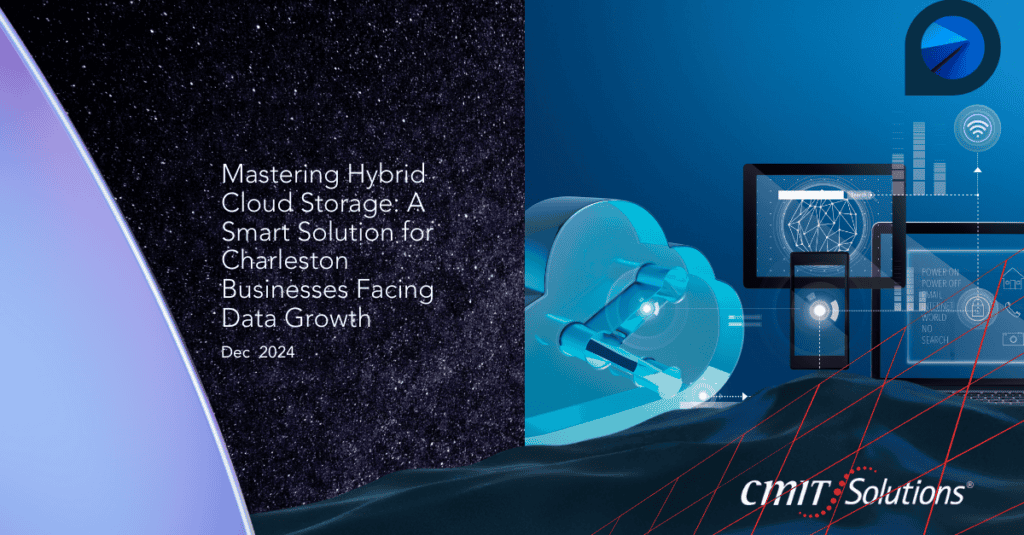In today’s rapidly evolving digital landscape, businesses of all sizes rely heavily on cloud services to drive growth, streamline operations, and safeguard data. Whether you’re a small startup or a well-established enterprise, selecting the right cloud service provider (CSP) is crucial for business success. With numerous options available, it can be challenging to determine which provider aligns best with your company’s goals and security needs.
At CMIT Solutions of Charleston, we specialize in guiding businesses through technology decisions that drive productivity and security. This comprehensive guide will explore the essential factors every business must consider when choosing a cloud provider, ensuring you make an informed decision that fuels sustainable growth.
1. Security and Compliance Standards
Data security is non-negotiable when it comes to choosing a cloud provider. Cyber threats continue to evolve, making robust security measures essential for protecting sensitive business data.
Key Security Features to Look For:
- Data Encryption: Both in transit and at rest.
- Multi-Factor Authentication (MFA): Adds an extra layer of protection.
- Regular Security Audits: To identify vulnerabilities.
- Firewall and Intrusion Detection Systems (IDS): For proactive defense.
- Compliance Certifications: HIPAA, GDPR, SOC 2, and ISO 27001.
Explore how multi-factor authentication can protect your business from unauthorized access.
For businesses in regulated industries, compliance is critical. A cloud provider must support compliance with industry-specific regulations. Learn more about HIPAA compliance for healthcare organizations and GDPR data protection.
2. Cloud Cost Optimization and Pricing Models
Cost efficiency is another major factor in selecting a cloud provider. Many businesses struggle with cloud overspending due to underutilized resources and lack of proper management.
What to Evaluate in Pricing Models:
- Pay-as-you-go vs. Reserved Instances: Flexibility versus cost-saving.
- Transparent Pricing: No hidden fees.
- Scalability: Ability to scale up/down without significant cost jumps.
CMIT Solutions of Charleston helps businesses understand cloud cost optimization strategies to maximize ROI.
- Reliability and Performance
Your cloud provider must deliver high availability and minimal downtime. Downtime can lead to lost revenue, productivity disruptions, and damaged customer trust.
Reliability Metrics to Consider:
- Service Level Agreements (SLAs): Guarantee uptime commitments.
- Global Data Centers: For better redundancy and failover.
- Disaster Recovery Options: To recover data quickly in emergencies.
Learn how data backup and recovery solutions protect your business during outages
4. Scalability and Flexibility
As your business grows, so will your IT needs. Choose a cloud provider that offers scalable solutions to support your company’s future expansion.
Scalability Features to Look For:
- Hybrid Cloud Solutions: Blend of public and private clouds.
- Flexible Resource Allocation: Add or reduce computing power as needed.
- On-demand Services: Pay only for what you use.
Discover how hybrid cloud solutions balance security and scalability for growing businesses.
5. Data Backup and Disaster Recovery
Data loss due to cyberattacks, human error, or natural disasters can cripple a business. A cloud provider should offer reliable data backup and disaster recovery solutions.
Critical Data Protection Features:
- Automated Backups: Scheduled and secure.
- Geographically Dispersed Data Centers: For disaster resilience.
- Fast Data Recovery: Minimize downtime.
Understand the difference between backup and data protection with our comprehensive guide.
6. Network Security and Monitoring
Strong network security is vital for preventing unauthorized access, data breaches, and cyberattacks. Your cloud provider must offer built-in network protection and monitoring.
Essential Network Security Measures:
- Firewalls: To block malicious traffic.
- Intrusion Detection and Prevention Systems (IDPS): Detects and stops threats.
- Network Monitoring Tools: For real-time threat analysis.
Implement the best practices in network security to keep your business protected.
7. Integration with Existing Infrastructure
A cloud provider should seamlessly integrate with your current IT infrastructure and software tools to avoid workflow disruptions.
Important Integration Capabilities:
- Software-Defined Networking (SDN): Simplifies network management.
- Support for Popular Tools: Microsoft 365, Google Workspace, etc.
- APIs for Custom Integrations: Connect custom business applications.
Explore how software-defined networking can streamline IT operations.
8. Unified Communication and Collaboration Tools
A cloud provider must offer tools that enhance team collaboration, especially for remote and hybrid work environments.
Key Communication Features:
- Unified Communications Platforms: Combine chat, video, and email.
- Remote Access Solutions: Secure and easy to use.
- Cloud-Based File Sharing: For team collaboration.
Discover the benefits of unified communications for improving productivity.
9. Vendor Reputation and Customer Support
The cloud provider’s reputation and customer support quality are essential. Poor support can lead to prolonged downtime and unresolved issues.
Support Services to Evaluate:
- 24/7 Customer Support: Available when you need it.
- Dedicated Account Managers: Personalized service.
- Knowledge Base and Training Resources: For self-service support.
Learn why businesses trust CMIT Solutions of Charleston for consistent and responsive IT support.
10. Compliance with Industry Regulations
Cloud providers must adhere to compliance standards relevant to your industry. Non-compliance can lead to fines and reputational damage.
Compliance Areas to Consider:
- Data Protection Regulations: HIPAA, GDPR, PCI DSS.
- Regular Compliance Audits: To ensure adherence.
- Security Certifications: ISO 27001, SOC 2.
Ensure regulatory compliance with our IT compliance audits for your business.
Conclusion: Let CMIT Solutions of Charleston Guide You
Choosing the perfect cloud provider is a critical decision that impacts your business’s security, efficiency, and future growth. By considering factors like security, scalability, integration, and compliance, your business can leverage cloud services for maximum success.
At CMIT Solutions of Charleston, we simplify this process by offering comprehensive IT services tailored to your needs. From proactive cybersecurity to cloud optimization, we help businesses make smart, secure technology decisions.
Ready to elevate your business with the right cloud solutions?
Contact CMIT Solutions of Charleston today for expert IT guidance and cloud support.





